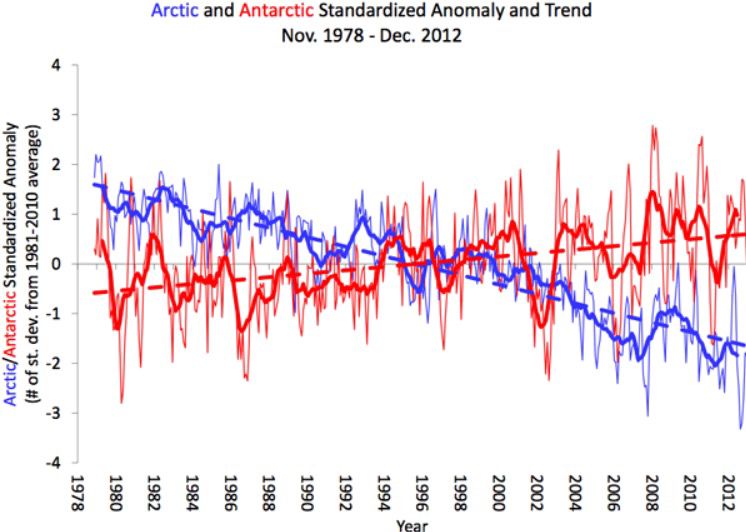Arctic vs. Antarctic
Arctic vs. Antarctic
I didn't make this up. NASA has reported that the sea ice surrounding Antarctica has reached a record high this year. It has reached 20 million square kilometers for the first time since 1979.
What's going on here? The Arctic Ocean ice has been declining both in the summer and winter seasons over decades. Since the 1970's the Arctic has lost 55,900 square kilometers of ice each year while the Antarctic has gained 18,900 square kilometers of ice per year. Obviously, the net loss of ice is still a result of global warming.

The goal of oceanographers and climatologists is to understand what's going on here.
One theory is the fact that there is no northern barrier around the whole perimeter of Antarctica, and this allows the ice to spread out. This is not the case in the Arctic. Landmasses surround the Arctic Ocean and prevent that.
Another more interesting theory is the fact that winds play a role in this effect because of the way that the wind whips around the Antarctic continent and pushes the thin ice out to cover more area. Snow also causes the ice to sink and allow cold ocean water to seep up and flood the snow, a slushy mix that freezes easier.
Also there is a low-pressure system that hangs over the Amundsen Sea and changes the wind patterns to sweep cold air from Antarctica over the Ross Sea, a process that could be influenced by the Ozone hole.
This data is complex and may not be all that significant. At this point, no one is sure why this is happening. The fact is that the amount of ice over the planet, both in the Arctic and glaciers is declining. This Antarctic effect is just an anomaly in the overall climate change pattern. It's definitely not an argument against climate change.
Thanks for reading.
Bạn đang đọc truyện trên: AzTruyen.Top